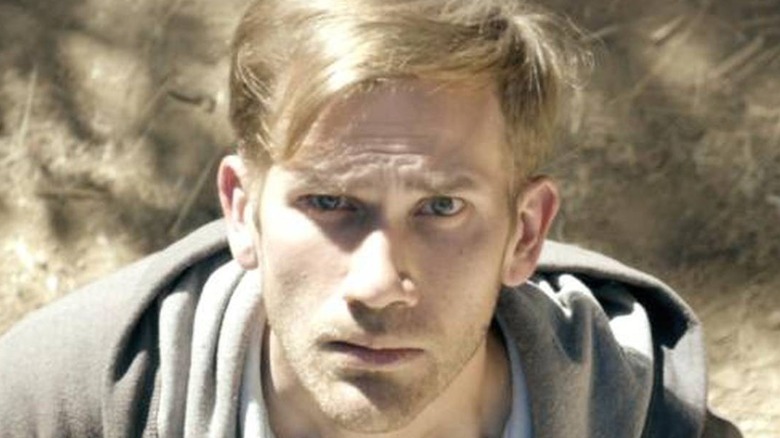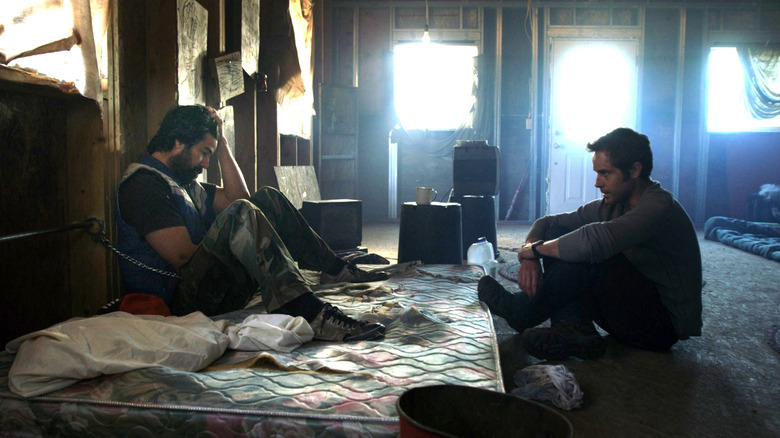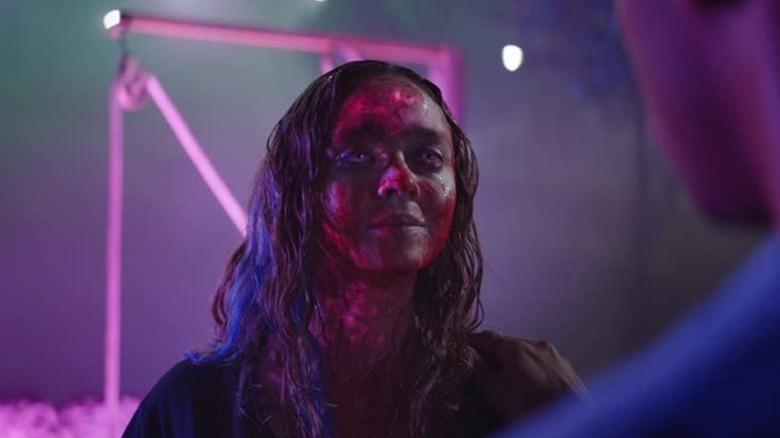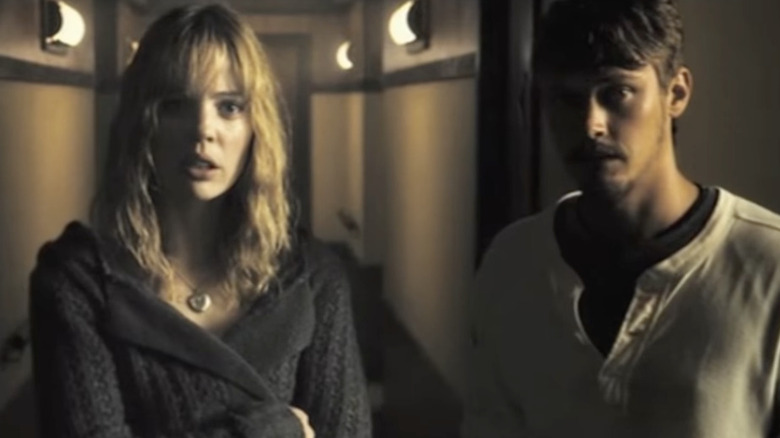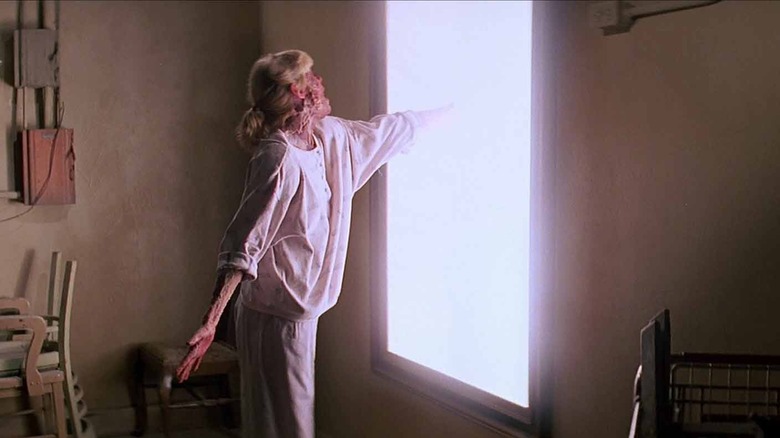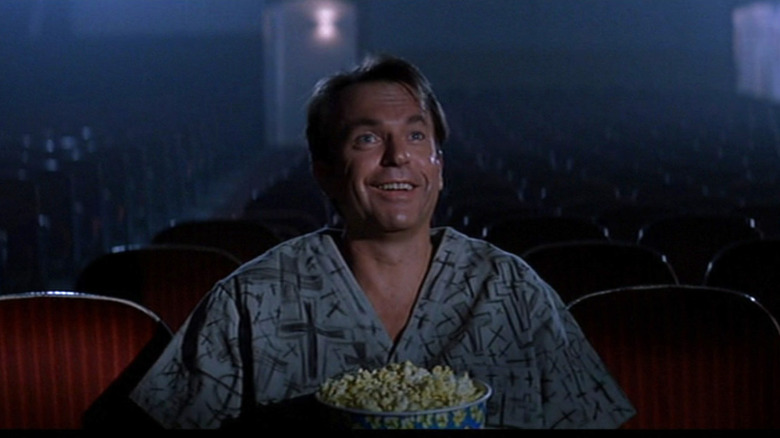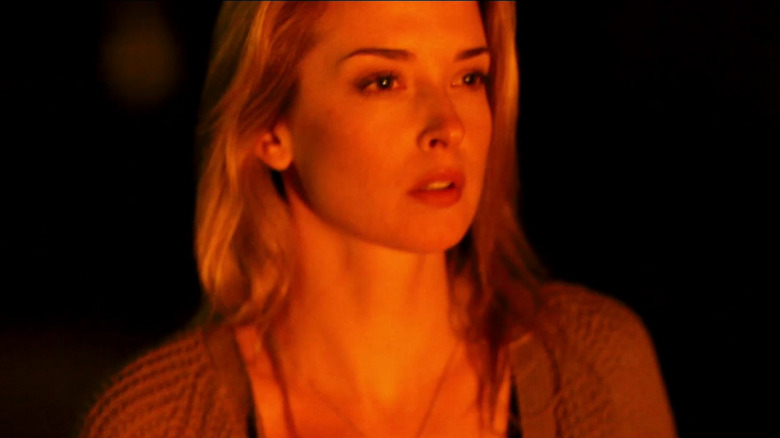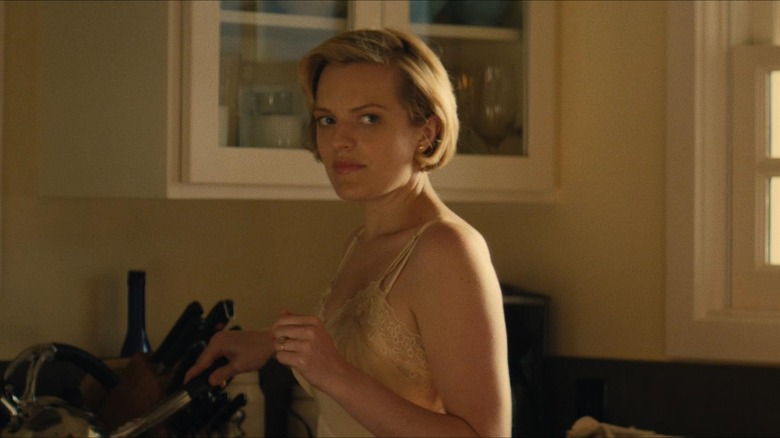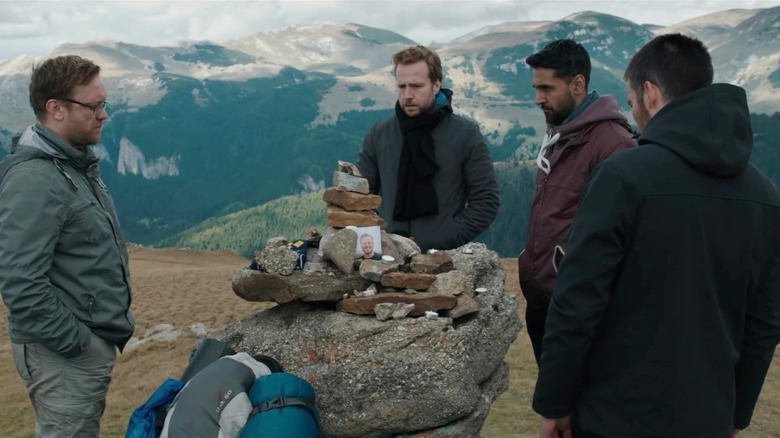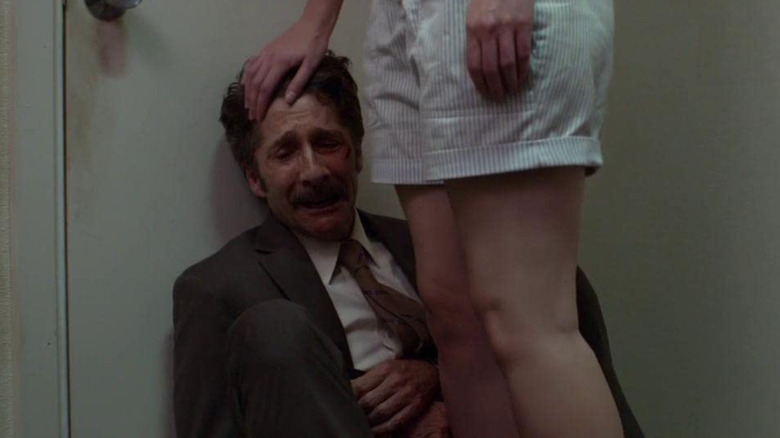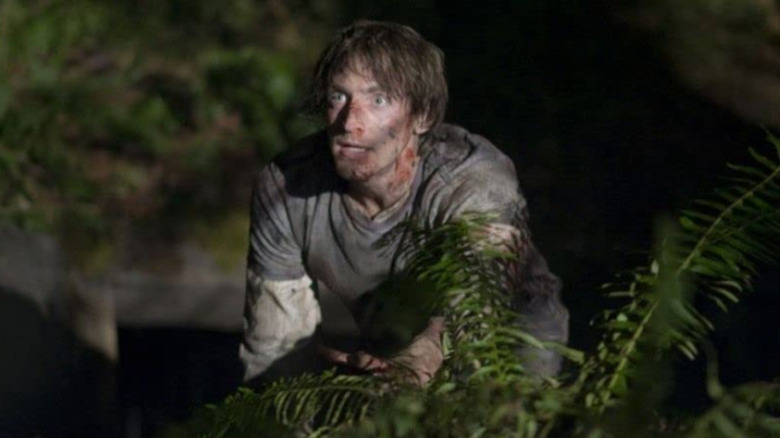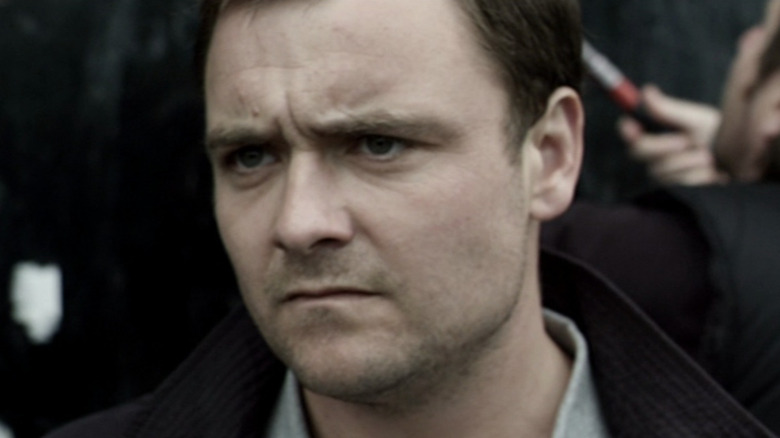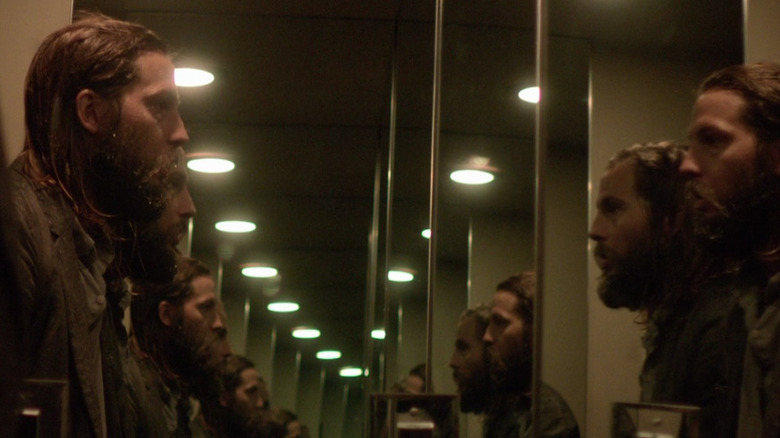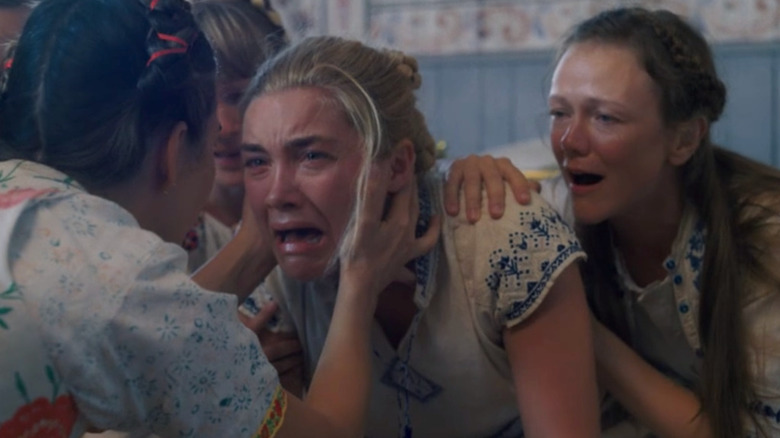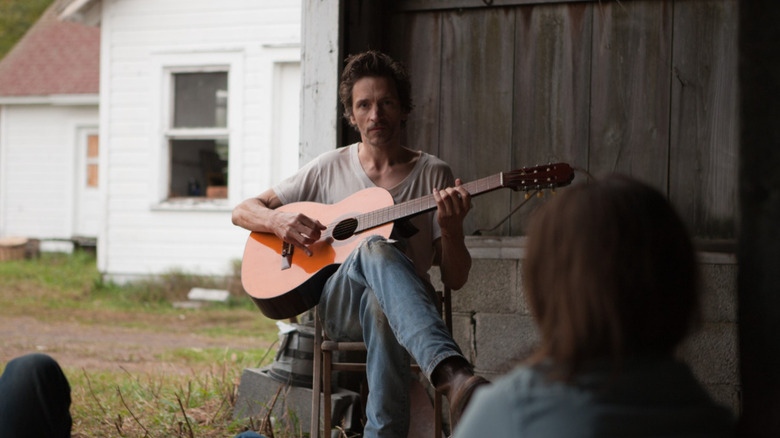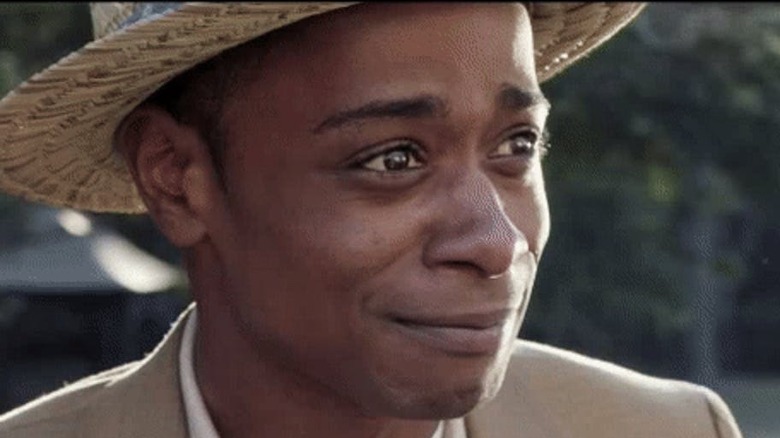15 Best Movies Like The Endless That Horror Fans Should Watch
Justin Benson and Aaron Moorhead directed and star in "The Endless," which wows even with — and perhaps, in part, because of — its low budget. Declared "a mind-bending Möbius strip of a movie" by The Guardian's Wendy Ide, and boasting quiet surrealism and gradual, ever-growing dread, this is a dark tale of two brothers, who return to Camp Arcadia, a commune described as a "UFO death cult." "The Endless" offers horror enthusiasts a character-oriented film full of rich and haunting world lore, clever practical effects, and lingering nightmare fodder that centers on the fractured bond between the protective — and secretive — Justin and the naïve and resentful Aaron.
But the most fascinating thing about "The Endless" is that for the first chunk of its run, it promises to be a slow-burning social thriller before subverting expectations. It pivots to become instead an unsettling cosmic horror about a sadistic entity that — due to its insatiable hunger for stories — has effectively imprisoned the humans unfortunate enough to wander into its rural domain.
For the viewing pleasure of the equally insatiable "Endless" fan, we've compiled a list of 15 like-minded movies, which include terrifying time loop stories, tales of paradoxes and doppelgängers, sharp meta-horror, disquieting social and psychological thrillers, sinister cult narratives, and apocalyptic Lovecraftian horrors.
Resolution (2012)
Essentially a prequel to "The Endless," Justin Benson and Aaron Moorhead's "Resolution" takes place in the same remote area of California, where graphic designer Michael is lured into the woods after seeing a video showing his best friend — the drug-addicted Chris — growing increasingly erratic. After finding his depressed and fatalistic friend living in a partially-constructed house (squatting on reservation land, as it happens), Michael decides to help Chris through a cold turkey detox right then and there. As if the withdrawal experience weren't difficult enough, things only get more nightmarish for the pair: A tribal security guard gives the friends five days to vacate the premises, and Chris also owes two exceptionally violent drug dealers product. But what's stranger — and more concerning — is that someone (or something) is starting to leave photographs and videos for Michael to find. The most unsettling part? In some of these images, Chris and Michael are the subjects.
NPR's Ian Buckwalter commends the meta-horror aspects of "Resolution," likening the film to "Cabin in the Woods" because "both are hugely satisfying exercises in examining the way in which stories are told." And that's true. But the reason we're launching this list with "Resolution" boils down to the fact that it's "an inventive, character-based story" (via Dread Central) that exists in the same fictional universe as "The Endless." What's more: Watching these interconnected gems back-to-back provides an enriching viewing experience that will better inform your understanding of each film.
If you or anyone you know is struggling with addiction issues, help is available. Visit the Substance Abuse and Mental Health Services Administration website or contact SAMHSA's National Helpline at 1-800-662-HELP (4357).
Color Out of Space (2019)
Based on H.P. Lovecraft's short story and starring Nicolas Cage, the violent and vibrant "Color Out of Space" may seem a little at odds with the quiet unease and simmering dread of "The Endless," but plenty of Redditors will tell you if you're a fan of one, you'll likely be a fan of the other. In fact, in response to user u/fozrok's request for other good horror akin to "Color Out of Space" — which they describe as "a country-set & family orientated 'The Thing'" — a few commenters point straight to "The Endless." All three of these films engage with Lovecraftian cosmic terrors, after all.
In "Color Out of Space," Nathan (Cage) relocates his family to his father's farm after his wife gets a mastectomy, only for a meteor from outer space to crash into their yard, distorting reality around the property and throwing their lives into horrific chaos. Desperate to save her loved ones from the grotesque suffering that's befallen them, daughter Lavinia (Madeleine Arthur) turns to a version of the Necronomicon for answers. But it's the Necronomicon, so ... you can probably guess what happens.
Though not quite as clever as "The Endless" — and while much gorier — BFI's Kim Newman believes "Color out of Space" is "almost low-key in its accumulation of dread, [and works] steadily towards a mini-apocalypse for one nuclear family." We'd argue that the members of Camp Arcadia in "The Endless," along with the other folks stuck in the monster's domain are — when they near the end of their loops — experiencing their own mini-apocalypses, too.
Triangle (2009)
"Triangle" is a tense and unsettling psychological horror film that follows single mother Jess (Melissa George), as she decides to take a day off from taking care of her young autistic son Tommy (Joshua McIvor) and take him sailing with some friends. That morning, however, Jess arrives at the dock alone, and tells her friend Victor (Liam Hemsworth) that Tommy is at school, even though it's Saturday. Things take an even stranger turn later when the group receives a distress call right before a storm capsizes their yacht and leaves them stranded at sea. Their presumed salvation comes in the form of an eerily deserted cruise ship. It's brief relief, of course, because that's when the real terror begins. Jess soon realizes she's stuck in a time loop and is forced to confront other versions of herself and the others, while becoming increasingly desperate to get back to the son she left behind.
Empire's William Thomas calls this movie "A satisfying mind-twister, with an unexpectedly poignant pay-off," while The Guardian's Peter Bradshaw tells us that this story "creates some real shivers." Like "The Endless," "Triangle" effectively evokes slow, simmering dread throughout its 99-minute run. Presumably it's this reason — along with its time loop focus — that has Redditors like u/bryanvb taking to the forums to suggest "The Endless" to fans of "Triangle" and we wholeheartedly agree that fans of one will love the other.
Prince of Darkness (1987)
"Prince of Darkness," the second of John Carpenter's unofficial Apocalypse Trilogy of cosmic horror films, follows quantum physicist Professor Howard Birack (Victor Wong) and his grad students. At the start of the film, upon the request of a priest (Donald Pleasence), these academics agree to help an order called "The Brotherhood of Sleep" study and analyze a tube of green liquid dwelling in the basement of an L.A. monastery. Turns out, this bizarre goo might just be the physical (and sentient) embodiment of Satan. On top of that terrifying discovery, this ill-fated group soon learns via their dreams that this monastery is ground zero for the looming apocalypse — that is, unless they can prevent the future devastation. This already difficult task becomes near-impossible when radiologist Susan gets exposed to, murdered, and possessed by the entity, and soon starts going after her colleagues.
While not initially well-received by critics — The Washington Post's Richard Harrington declared that this movie "deserves to be shut up in a canister for 7 million years" — "Prince of Darkness" has gained more praise in recent years (via Film School Rejects). Nowadays, writers like The State Hornet's Bradley Hinkson consider it a "masterpiece of horror" that offers an "underlying sense of doom and dread" throughout. It's that underlying dread, in addition to its Lovecraftian vibe, inventive take on cosmic (and religious) horror, and rich and expansive lore, that makes "Prince of Darkness" worthy of any "Endless" fan's attention.
In the Mouth of Madness (1994)
"In the Mouth of Madness" starts near the end of the story, with protagonist John Trent (Sam Neill) stuck in a psychiatric hospital, where he tells a skeptical Dr. Wrenn (David Warner) about the horrors that led him to his padded prison. We flashback to insurance investigator Trent getting hired to work with Arcane Publishing, whose client — the famous horror novelist Sutter Cane (Jürgen Prochnow) — has just finished his final book, but has also gone missing. Trent is tasked with tracking down Cane, so he sets off on this mission with Linda (Julie Carmen), Cane's editor. As they travel to Hobb's End (actually one of Cane's fictional settings), she reveals that many of Cane's readers have been suffering bizarre, psychotic episodes. Basically, people are turning into evil, murderous creatures, and the cause of all this destructive grotesquery might just be Cane's published works.
According to Wicked Horror's Nat Brehmer, this third movie in John Carpenter's Apocalypse Trilogy "is pure meta-horror and embraces that identity. ... This is about the very idea of horror, it's a cosmic horror movie that looks at the genre as a cosmic theme." In that way, it's easy to compare it to both "Resolution" and "The Cabin in the Woods." But it's the Lovecraftian madness here that earns it a spot on this list. Just like in "The Endless," we glimpse the grand terrors, utter hopelessness, and incomprehensible suffering that ancient entities from other dimensions are capable of inflicting on the human race.
Coherence (2013)
While in "The Endless" Aaron and Justin eventually learn that the strange and terrifying things happening in and around the cult are connected to the moons — and the ever-lurking Lovecraftian monster — the catalyst for the slow-growing terror that the Californian friends in "Coherence" endure is Miller's Comet. Essentially, during one incredibly stressful dinner party, the comet's passing sparks an astrological event that rips reality apart. As a result, the group comes face-to-face with their own doppelgängers. All of this quantum chaos soon leads to a fight to survive the night, with the friends' already waning faith in each other — and maybe also in themselves — deteriorating.
The Hollywood Reporter's Stephen Dalton commends James Ward Byrkit for "cleverly building an unsettling psycho-thriller about cosmic chaos into a talk-heavy domestic-set film." Featuring an ensemble cast that includes Nicholas Brendon and Lorene Scafaria, and filmed in Byrkit's own home with less of a script and more of a set of guidelines and basic plot arcs for the characters, our actors predominantly improvise the narrative details here, which creates a bizarre but magnetic tone that feels simultaneously off-putting and authentic. Similar to "The Endless" in its clever use of practical effects and its anxiety-inducing tension, "Coherence" is another film that's made all the better because of its lower budget. Ultimately, it's a dark and imaginative blend of science fiction and horror that's worthy of any "Endless" fan.
The One I Love (2014)
For squeamish horror enthusiasts who appreciate the relative lack of gore in "The Endless," as well as its focus on the strained relationship between two brothers, we highly suggest Charlie McDowell's gore-free domestic thriller, "The One I Love." Rather than two brothers, this narrative centers the struggles of an embittered married couple. Prompted by their therapist — played by the one and only Ted Danson! — Ethan (Mark Duplass) and Sophie (Elisabeth Moss) spend a weekend away from the hustle and bustle of the real world to work on their issues and try to repair their shattered bond. Trouble is, when they venture to the vacation rental their therapist has booked for them, they discover they're not the only ones there. What follows is a slow-burning tale full of ratcheting dread, in which our characters' true selves are slowly revealed after they're confronted by their own doppelgängers.
Ultimately, we liken this to "The Endless" because it boasts a similar kind of disquiet, playing with viewer expectations by pretending to be one kind of movie before pivoting and presenting us with an unexpected — but not unwelcome — genre shift. While "The Endless" gives off social thriller vibes before delving into time loopy Lovecraftian madness, "The One I Love" disguises itself as a romantic dramedy before offering audiences surreal, psychological horror. In this and other ways, both leave you thinking well after the credits have rolled.
The Ritual (2017)
Based on Adam Nevill's novel of the same name, "The Ritual" follows a group of friends, who hike Sweden's Kungsleden to work through the grief of the death of their friend Rob (Paul Reid). Rob was killed during a robbery, which has sent Luke (Rafe Spall) into a guilt-fueled spiral, as he struggles to cope with his shame around his own actions during that fatal event. Not long into their trip, Dom (Sam Troughton) hurts his knee, and the crew, in an effort to shorten their route, wades into the depths of the forest.
In the same way we know Aaron and Justin venturing back to Camp Arcadia is a dangerous mistake, we know, too, that only horrors await this group once they choose to cut through the woods. There, they stumble upon a gutted elk and foreboding tree markings, before seeking refuge in an abandoned cabin for the night — where nightmares thwart any possibility for restful sleep. In the morning, when Luke discovers concerning wounds on his chest, the group's situation shifts from unnerving to downright terrifying, and their chances of making it out alive rapidly plummet.
"The Ritual" deals in cults, remote lands, and sadistic, god-like monsters, like "The Endless." However, as one Redditor notes in a discussion thread, "The Ritual is a great medium-budget that has a similar feel but totally different ideas to 'Resolution' and 'The Endless.'" On top of that, according to users like u/AlexanderTheGreatly, "the main character develops heavily throughout the entire film," which feels fresh for the horror genre, and is bolstered by the strong acting. Be forewarned, though: this one also makes the list for creepiest Netflix movies you should never watch alone.
Faults (2014)
In writer-director Riley Stearns' feature-length debut "Faults" nothing seems to be working out in the life of cult expert Ansel Roth (Leland Orser). He's so strapped for cash that he's trying to use expired vouchers to eat. He's stealing towels from his hotel. He has a scrapped television show under his belt. Even the specialist's speaking engagements are tainted failures, as the latest one ends with a grief-stricken man blaming Roth for the death of his cult-surviving sister and violently assaulting Roth for it. The fact that Roth's manager, Terry (Jon Gries), decides to dump him as a client — and worse, demand he pay all his debts back ASAP — is just the cherry on top. Cue Evelyn (Beth Grant) and Paul (Chris Ellis), two fretting parents who've sought Roth out to help in "deprogramming" their brainwashed daughter, Claire (Mary Elizabeth Winstead). While Roth initially refuses, it doesn't take long for his money issues and the promise of compensation to change his mind. But, of course, nothing — including Claire's situation — is as it seems.
In response to Redditor u/MrHavoc415's request for movies similar to "The Endless," the top commenter suggests "Faults," and we wholeheartedly agree with that recommendation. Not just because they're both quiet, slow-burning cult movies with some haunting twists, but because they're both character-focused cult movies that evoke visceral feelings of anxiety and simmering dread. Critics didn't find many faults with this film, with IndieWire's Eric Kohn writing that "the strongest aspects of 'Faults' stem from its completely unpredictable atmosphere. You might anticipate the twists before they arrive, but not the way they feel."
The Cabin in the Woods (2011)
Written as both a critique — and a love letter — to the slasher genre (via East Valley Tribune), "The Cabin in the Woods" sees a secret organization target a group of college kids by steering the unwitting friends into a cabin in the woods so as to enact a sacrificial ritual in the hopes of appeasing the Ancient Ones. To that effect, the organization works to mold each member of the group into a particular horror archetype, from The Final Girl to The Fool to The Scholar.
Considering some reviewers compare this meta-horror film to "Resolution," the prequel movie that's set in the same universe as "The Endless," we'd say this modern-day classic is more than worthy of our list. Ultimately, "Cabin in the Woods" is splashier and bloodier than either Benson and Moorhead film, and it's certainly not the slowest of burns. But like the brothers in "The Endless" or the two best friends in "Resolution," the group here gets plenty of (sometimes painfully obvious) warning that they need to get out of this creepy place before it's too late — lest they fall victim to evil supernatural entities. In the case of all three movies, when the characters ignore these (often glaring) red flags — and even when they finally start to heed them — they're often condemned to suffer truly horrific consequences.
Kill List (2011)
Ben Wheatley's "Kill List" begins eight months after ex-military-turned-hitmen Jay (Neil Maskell) and Gal (Michael Smiley) perform a job in Kiev. The specific details regarding this job are vague, but it's clear it didn't go well. In fact, it's clear that Jay is still suffering from post-traumatic stress because of it, and he might even be having trouble distinguishing fact from fiction. In short, he's gradually losing his grip on reality. Though he's still in no way ready to get back into the field after this pivotal — and presumably disastrous — event in Kiev, his wife Shel, along with best friend (and partner) Gal, coerce Jay into accepting a new job during one incredibly tense dinner party. It becomes quite apparent — for the audience, at least — that there's something nefarious going on, when the client forces Jay to sign his contract with blood and gives him a "kill list" of three prominent figures. Things only get stranger and bloodier from there.
IndieWire's Eric Kohn says that this is "the brutally unsettling masterpiece that you need to see twice" in order to understand this "powerfully humanistic drama, loose brain bits and all." This movie takes a more "evil capitalist" approach to cults — à la Chelsea Stardust's "Satanic Panic" and Roman Polanski's "Rosemary's Baby" — rather than a cosmic one. But, like "The Endless," it offers head-spinning surrealism and scenes that often feel like odd, confusing, and nightmarish dreamscapes. And while Wheatley's psychological thriller is not Lovecraftian, it is full of subtle and compelling character development, a strength it shares with our favorite time loopy horror story.
The Invitation (2015)
Logan Marshall-Green stars as the divorced (and morose) Will in Karyn Kusama's "The Invitation," a clever thriller that the director herself describes "as a metaphor for what the nightmare of anxiety really is" (via The Verge). Will brings his girlfriend Kira (Emayatzy Corinealdi) to the Hollywood Hills for a painfully awkward and uncomfortable dinner party organized by his ex-wife and her new partner, David (Michiel Huisman). Returning to his old home pushes him back into the throes of grief, and during the evening, the memories of past tragedies — like the untimely death of his young son — haunt him. Worse, though, is that as the night goes on, we start to glimpse the sinister and possibly violent intentions behind this gathering.
For Reddit users like u/kicksjoysharkness, part of the appeal of "The Invitation" is that it's not "afraid to go slow and build an atmosphere." Other Redditors note that the "film is a masterclass in pacing and escalating tension" and elaborate that "It starts out so slow and methodical but every minute it gets a little more suspenseful until things explode." Sounds familiar, right? And if that weren't already enough for "The Invitation" to earn a place on this list, this story effectively plays on anxieties without the use of excessive gore. Essentially, this is quiet horror at its finest.
Midsommar (2019)
While "The Endless" explores the fractured bond between two brothers, Ari Aster's "Midsommar" focuses instead on the crumbling romantic relationship between two graduate students. When Dani (Florence Pugh) loses her family in a devastating and heart-wrenching tragedy, her boyfriend Christian (Jack Reynor), who'd been hoping to break up with her, decides to spare her the extra trauma ... sort of. He's not emotionally engaged or committed anymore, but rather than actually tell her that, he chooses to just, well, not say anything at all. Another thing he tries to keep quiet? His summer plans, which involve going with a group of other grad students to visit their friend Pelle's ancestral commune in the remote and perpetually sunny Swedish hills for a rare but significant midsummer celebration. The avoidant Christian winds up reluctantly inviting the understandably depressed and frustrated Dani along, only for the group to stand witness to disturbing — and deadly — rituals upon their arrival.
Reddit user u/PeepsInThyChilliPot is a fan of "Midsommar," who doesn't care for "traditional dark and dingy horror," so a number of other Redditors suggested "The Endless." And it's true that both "The Endless" and "Midsommar" are weird, experimental, and largely character-oriented cult movies. At its core, according to BuzzFeed News' Alison Willmore, "Midsommar" is "about a hunger for belonging, a desire that stretches beyond the scope of [the movie's] central toxic romance to include the idea of a more authentic, close-knit way of life." And, ultimately, isn't that exactly what younger brother Aaron yearns for in "The Endless," too?
Martha Marcy May Marlene (2011)
In "Martha Marcy May Marlene," Elizabeth Olsen stars as a young woman who, after escaping the clutches of an abusive cult that dwells in the Catskills, reaches out to her estranged older sister for help. Her sister Lucy (Sarah Paulson) brings Martha (also known as "Marcy May" by the creepy, Manson-y cult leader and his followers and as "Marlene Lewis" any time she answers the cult's landline) to a Connecticut lake house to recover. But during her stay, Martha, who's been stripped of her identity by the cult, struggles to adjust to life without them, and flashbacks threaded throughout the storyline give viewers insight into the disturbing situations that drove Martha to flee in the first place.
In a Reddit discussion thread, user u/redbullmascot describes "Martha Marcy May Marlene" as "a great slow-burning psychological thriller" before requesting suggestions for like-minded movies — preferably ones "showing scenes inside cults, looking at the psychological/controlling aspects." A few commenters recommend "The Endless," and we have to agree. While there's no sinister magic at work in this cult story — or any other-worldly Lovecraftian monsters, for that matter — these two movies, with their focus on character, sibling relationships, and quiet, slow-building dread, often strike a similar tone. In fact, The Guardian's Peter Bradshaw begins his review of "Martha Marcy May Marlene" with the declaration that it's "a disquieting and ambiguous movie in a classic US indie style," and it's not lost on us that he could just as easily be talking about "The Endless" with those words.
Get Out (2017)
Jordan Peele's "Get Out" sees biracial couple, Chris (Daniel Kaluuya) and Rose (Allison Williams), making the dreaded "meet the parents" weekend trip. In the same way that Justin, despite perhaps knowing things about the cult that Aaron doesn't, agrees to go back to Camp Arcadia for his little brother's sake, Chris — despite his own reservations — agrees to venture out to the Rose's family estate for her. Right away, we realize that once our protagonist reaches his destination — in this case, the house of a wealthy white family — only horrors await. Chris has unsettling interactions with the Stepford-like gardener and housekeeper, a near-fight with Rose's creepy brother, and a terrifying experience with hypnosis. And that's just the first night.
In response to a Redditor looking for psychological horror film akin to "Get Out," user u/TheBadWolf says "I recently watched 'The Endless' and for the first half of the movie I kept thinking 'this is 'Get Out' for white people," but we'll let you be your own judge regarding that claim. To us, Jordan Peele's award-winning film is a masterful, racially-charged blend of meta, folk, and horror-comedy. It earns a place on this list because it's a clever, character-oriented, and relationship-focused thriller that boasts underlying, gradually growing tension and just the right touch of dark science fiction. For those reasons, it's not difficult to imagine either storyline — the one in "The Endless" or the one in "Get Out," — as a skin-crawling episode of "The Twilight Zone."
